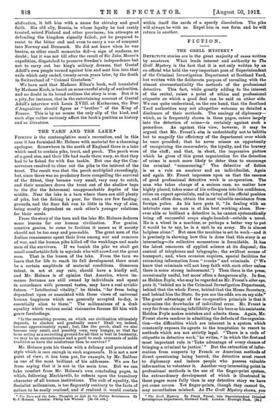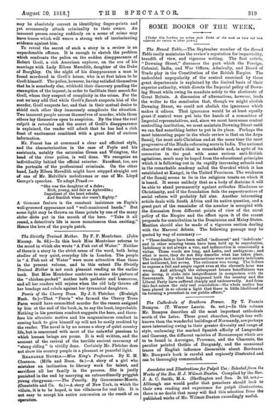FICTION.
THE GRELL MYSTERY.*
DETECTIVE stories are in the great majority of cases written by amateurs. What lends interest and authority to The Grell Mystery is the fact that it is not only written by an ex-official who held the very important post of Superintendent of the Criminal Investigation Department at Scotland Yard, but written with the deliberate purpose of revealing with the utmost circumstantiality the methods of the professional detective. This fact, while greatly adding to the interest of the recital, raises a point of ethics and professional etiquette on which a good deal can be said on either side. We can quite understand, on the one hand, that the Scotland Yard authorities may not altogether welcome so detailed a disclosure of their methods. The analogy of diplomacy— which, as is frequently shown in these pages, enters largely into the detection of crime—is certainly against such a procedure. As against this view, however, it may be argued that Mr. Froest's aim is undoubtedly not to belittle but to magnify the efficiency of the department over which he once presided ; that he never misses an opportunity of recognizing the camaraderie, the loyalty, and the bravery of the staff ; and that, in short, the impressive picture -which he gives of this great organization for the detection of crime is much more likely to deter than to encourage the criminal "commencing." The detective of fiction is as a rule an amateur and an individualist. Again and again Mr. Froest impresses upon us that the essence of good professional detective work is co-operation. The man who takes charge of a serious case, no matter how highly placed, takes some of his colleagues into his confidence, relies on expert specialists, and in virtue of his official position can, and often does, obtain the most valuable assistance from foreign police. As his hero puts it, "In dealing with an intricate case no man is at his best working alone. How- ever able or brilliant a detective is, he cannot systematically bring off successful coups single-handed—outside a noveL He is a wheel in a machine, or perhaps a better way to put it would be to say, he is a unit in an army. He is almost helpless alone." But once the machine is set to work—and it is precisely in showing how this is done that this story is so interesting—its collective momentum is formidable. It has the latest resources of applied science at its disposal ; the control of telephones and telegraphs; the swiftest means of transport; and, when occasion requires, special facilities for extracting information from " crooks " and criminals. (" We know that criminals will not keep faith with each other unless there is some strong inducement.") Then there is the press, occasionally useful, but more often a dangerous ally. In fine, as Heldon Foyle, who may be regarded as Mr. Froest's alter ego, puts it, "behind me is the Criminal Investigation Department, behind that the whole Force, behind that the Home Secretary, and behind him the State. So you see the odds are on my side." The great advantage of the co-operative principle is that it minimizes the drawbacks of individual error. Mr. Froest is very far from claiming infallibility for his hero or his assistants. Heldon Foyle makes mistakes and admits them. Again, Mr. Froest shows candour in admitting the defects of the organize, tion—the difficulties which are inherent in a system which constantly exposes its agents to the temptation to resort to methods which are not strictly legal. " There is a code of etiquette in detective work," he writes, " in which the first and most important rule is ' Take advantage of every chance of bringing a criminal to justice.' " But the extraction of infor- mation from suspects by French or American methods of direct questioning being barred, the detective must resort to diplomacy and induce people who possess valuable information to volunteer it. Another very interesting point in professional methods is the use of the finger-print system, the extraordinary development of which is illustrated in these pages more fully than in any detective story we have yet come across. Yet finger-prints, though they cannot lie, may nevertheless mislead. As The Grell Mystery shows, you • The Grell Mystery. By Frank Froest, late Superintendent Criminal Investigation Department, Scotland Yard. London : Eveleigh Nash. [68.1
may be absolutely correct in identifying finger-prints and yet erroneously attach criminality to their owner. An innocent person coming suddenly on a scene of crime may leave traces which will weave a strong web of incriminating evidence against him.
To reveal the secret of such a story in a review is an unpardonable offence. It is enough to sketch the problem which confronts the police on the sudden disappearance of Robert Grell, a rich American explorer, on the eve of his marriage with Lady Eileen Meredith, daughter of the Duke of Burghley. On the night of his disappearance a man is found murdered in Grell's house, who is at first taken to be Grell himself. The police, however, having satisfied themselves that he is somebody else, withhold their discovery pending the resumption of the inquest, in order to facilitate their search for Grell, whom they suspect of complicity in the crime. For the rest we'may add that while Grell's fiancee suspects hini of the murder, Grell suspects her, and that in their mutual desire to shield each other they immensely complicate the situation. Two innocent people accuse themselves of murder, while three others lay themselves open to suspicion. By the time the real culprit is revealed and the secret of Grell's disappearance is explained, the reader will admit that he has had a rich feast of excitement combined with a great deal of curious information.
Mr. Froest has at command a clear and efficient style, and the characterization in the case of Foyle and his assistants, notably the saturnine Green and Wrington, the head of the river police, is well done. We recognize an individuality behind the official exterior. Exce}lent, too, are the portraits of the professional criminals. On the other hand, Lady Eileen Meredith might have stepped straight out of one of Mr. Melville's melodramas or one of Mr. Lloyd George's speeches. To adapt Praed
"She was the daughter of a duke ; Rich, young, and fair as Aphrodite; Impatient of the least rebuke,
And fiendish when she wasn't flighty."
A. tiresome feature is the constant insistence on Foyle's well-groomed appearance and "well-manicured hands." But some light may be thrown on these points by one of the many obiter dicta put in the mouth of the hero. "Take it all
round, a detective's life is more monotonous than exciting." Hence the love of the purple patch.



































 Previous page
Previous page